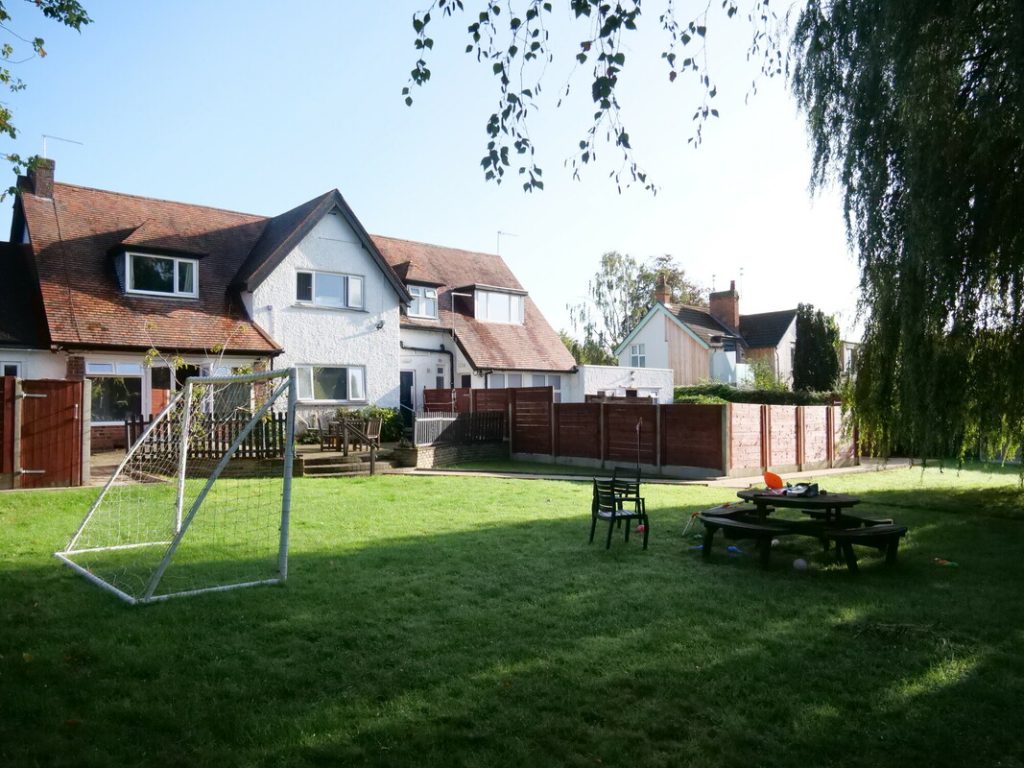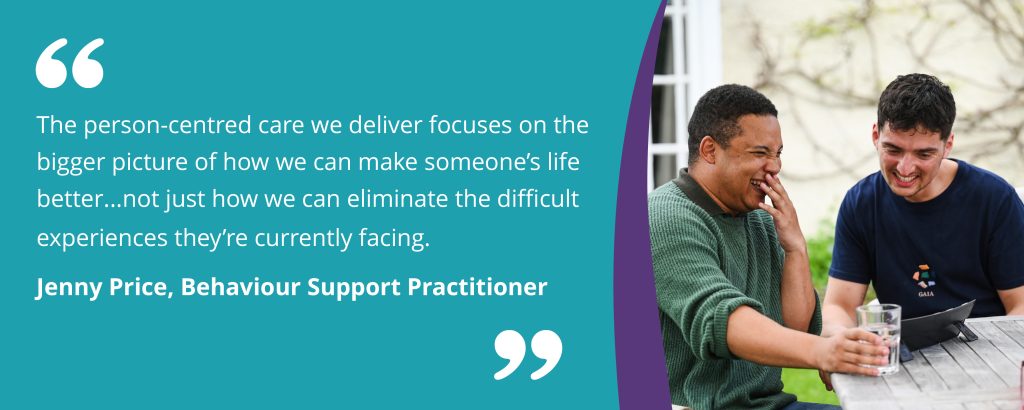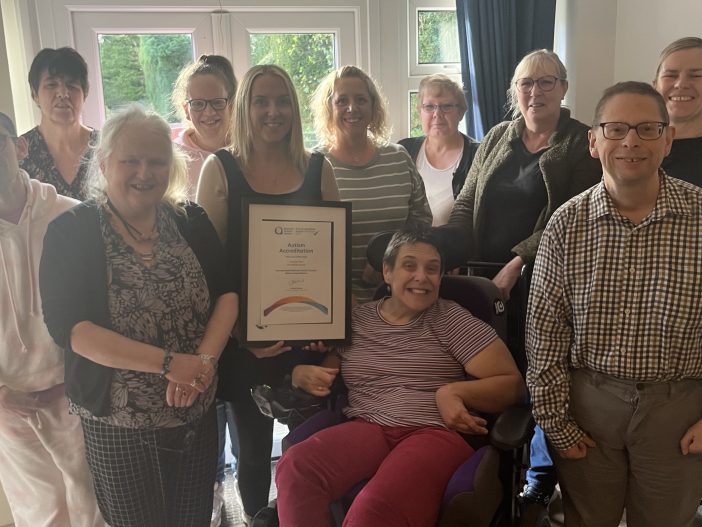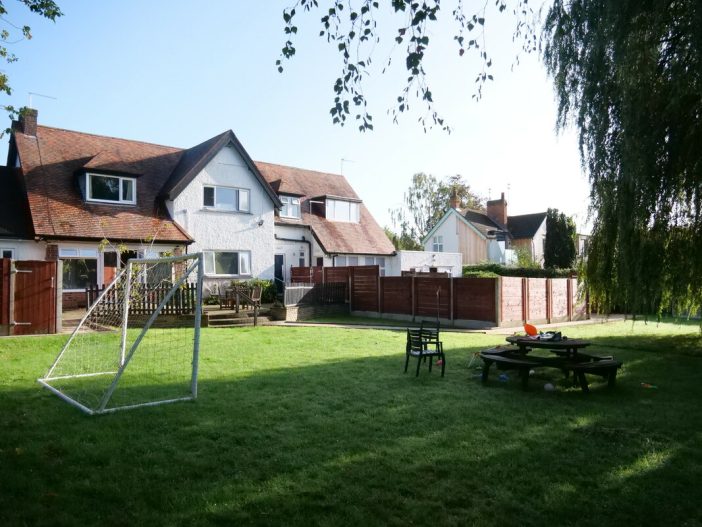How unplanned care flats are preventing hospital admissions

Ruddington View, our residential care home in Nottinghamshire, has two dedicated unplanned care flats designed to support those in crisis and prevent hospital admissions.
Our service has formed a collaboration with Nottinghamshire Transforming Care Partnership (TCP) so more people in the area can get the care and support they need, when they need it most!
The TCP was created in partnership with NHS England, and see’s involvement from Nottinghamshire County Council, Nottingham City Council, and wider local Integrated Care Systems (ICSs).
The TCP aims to provide people with autism, learning disabilities and mental health conditions an alternative living environment while reducing long-term hospital stays.
They achieve this via dedicated unplanned care accommodation, offering person-centred support they wouldn’t receive in hospital.
Ready to delve deeper into unplanned care? We caught up with Tracey Hurt, Service Manager at Ruddington View, and Behaviour Support Practitioner Jenny Price, to learn more about what it is and who can benefit from it.
What are unplanned care flats and who can benefit from them?
Tracey: Unplanned care flats support people who are at considerable risk of hospital admission through alterative care settings.
For example, a candidate for unplanned care could be an individual with a learning disability and declining mental health, posing a risk to themselves or others through self-harm or physically aggressive behaviour.
At Ruddington View, our unplanned care flats are two self-contained bungalows adjoining to the main home. They are managed by ourselves and the NHS Intensive Community Assessment and Treatment Team (ICATT) – formed of health professionals such as nurses and psychiatrics.
Before an individual can access our unplanned care flats, they need to be open to ICATT and already receiving input, they will then set the objectives of the stay. We then facilitate the support, which varies from person to person and is adapted to suit their individual needs.
The base level of care is 1:1 support, 15 hours a day. Some individuals may need 2:1 support, and if medication changes are required, this can be monitored up to 24 hours a day.
The ICATT will offer support, guidance and assessments throughout someone’s stay. We are here to ensure their day-to-day support meets the their needs, and ICATT then assist with any specialist support required. This specialist support can include occupational therapy, speech and language therapy or psychology support.
How quickly can someone be transferred to unplanned care?
Tracey: We’ve had instances where individuals have been transferred to us within six hours of their initial assessment and referral with the ICATT.
Our team at Ruddington View are well trained and equipped to manage short turnaround times. If the individual is being transferred from another social care service, we usually receive more information about their condition and needs prior to their arrival.
If they are transferred from their own home, the information we receive is minimal. In this situation, our team utilise their training and experience to work with the individual to meet their specific needs.
The team have a fantastic level of knowledge across a range of conditions including autism, mental health needs and Prader-Willi syndrome.

How long can someone stay in unplanned care flats?
Tracey: Our short-term intervention support typically lasts up to 12 weeks, however some individuals may only be with us for a couple of days. When someone has been referred to us, their support team will collaborate closely with the person’s family and any health care professionals to determine their needs and duration of stay.
In some instances, we may support people in unplanned care beds for longer than 12 weeks. An example would be if someone has experienced behavioural issues, meaning their new placement is no longer suitable due to the safety of themselves or others being at risk. In this case, we would meet with the person’s family and the ICATT to work towards a suitable transition plan to an alternative placement.
The ICATT make the final decision on whether time in unplanned care is to be extended. If someone cannot extend their stay beyond 12 weeks, we can explore vacancies in the main house at Ruddington View on a temporary basis if the environment is suitable. If that isn’t possible, then exploring alternative temporary accommodation that’s right for them would be an option.

How do you deliver person-centred care in a short time frame?
Jenny: The person-centred care we deliver focuses on how we make someone’s life better on the whole…not just eliminating the difficult experiences they are currently facing. As a Behaviour Support Practitioner, I train our team so they can react to short-turnaround times and support someone to live a more fulfilling life!
Training topics such as safety intervention, incident reporting, and physical intervention, ensures the team have the experience needed to deliver high-quality care.
Tracey: Tailoring the environment to meet the needs of the people we support is key in making them feel comfortable. We learn their preferences, dislikes and what facilities at the service are suitable for them – ensuring they are always kept safe.
Depending on someone’s needs, we have facilities where people can access the garden, kitchen and communal areas to interact with other housemates. Before the people we support access any of these areas, they will be assessed by their support team to ensure themselves and their housemates are safe.
For those that are safe to live more independently, our team support them with tasks such as shopping and cooking.
What are someone’s options after unplanned care?
Tracey: These individuals will stay with us until they have shown good progress to move on – often returning home or back to the service they were admitted from.
The relationship we’ve built with the ICATT has really enhanced the support we offer. Both teams have a high level of trust with each other, monitoring progression and making key decisions when someone is in the process of transitioning to a new location.
How do you prepare someone for transitioning out of unplanned care?
Jenny: During the transition period, we evaluate how we can support someone to where they need to be on their journey.
For someone in unplanned care, the transition options typically include returning home with the support of family, supported living or residential care homes.
If someone stays the duration of 12 weeks with us, we will start the transition process about one and a half months into their stay. This gradually builds up their transition so it’s less overwhelming.
We communicate with the person’s family and their new support team throughout the transition period. Once their new location has been confirmed, we organise a few hours a week for them to visit and get used to their new environment.
We then progress them to overnight stays until they have completely transitioned to that location full time. During this stage, the person will begin to get familiar with their new support team if required.
To ensure the person’s support network is consistently updated, we arrange regular multi-disciplinary team meetings (MDT). During these meetings we discuss a person’s condition with health care professionals, and their progress towards transitioning out of unplanned care. To support this, we send email chains to keep everyone updated on the person’s progress.
In some cases, the person in unplanned care can struggle to understand their transition process. Showing them pictures and social stories is a fantastic way to help them understand what is going on in an engaging way.
Find out more!
To learn more about Ruddington View and how we support people like Shona that are in need of unplanned care, please visit our dedicated service page.

 Information
Information 

